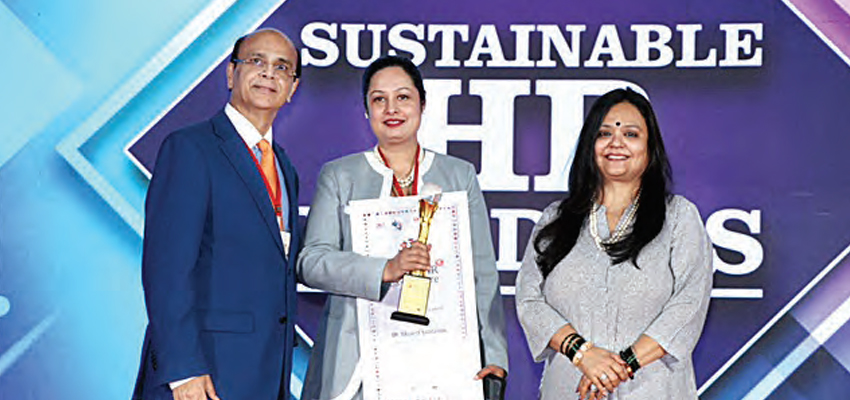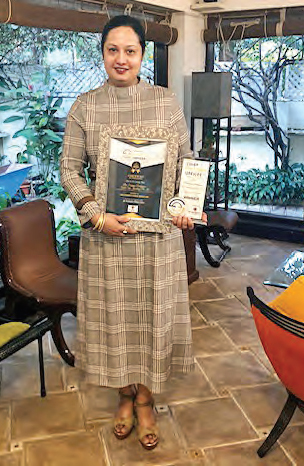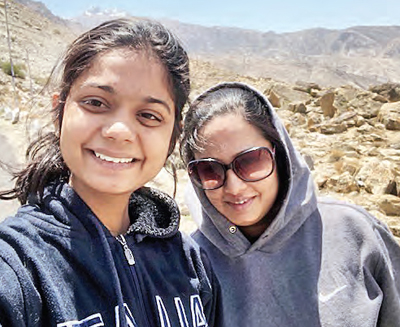Stay Relevant and Develop Resilience

True leaders convert challenges into opportunities. Perhaps no one exemplifies this adage more than Dr Saumya Badgayan, General Manager-Corporate Strategy, HR & IR at Gold Star Jewellery Pvt. Ltd. Hailing from a small town, she braved family pressure and several professional obstacles to make a name for herself in the highest echelons of the corporate world. She chats with Corporate Citizen about her humble beginnings, her inspiring journey of success & the fascinating lessons she learnt along the way
"The teachers instilled and inducted in us a sense of self-worth, which was beautiful, and it gave us a sense of self-respect while also blending in with the traditional family environment"
 With the Chief Strategy Officer winner trophy
With the Chief Strategy Officer winner trophyCorporate Citizen: Take us through your formative years.
I was born and brought up in Jabalpur, which is a small town in Madhya Pradesh. It is known for its Dhuandhar Falls, which is known as the ‘Indian Niagara Falls’. It is also known for its huge cantonment area. Because of this, and also because it has a lot of British influence, a lot of very good schools and colleges have come about in Jabalpur. I was educated in a convent school. We had teachers that came from all over the world to teach, mostly from Europe. Thanks to this fact, we had a very cosmopolitan outlook even though we were in a small town. The teachers instilled and inducted in us a sense of self-worth, which was beautiful, and it gave us a sense of self-respect while also blending in with the traditional family environment which is a hallmark of small towns. After my high schooling, I pursued medicine as a career, as it was my mother’s dream. But it was her dream, not mine. Ever since I was in the 8th standard, I wanted to be someone like Sulajja Motwani, Naina Lal Kidwai or Sudha Murthy. During those days, there were two business magazines-Business Today and Business World, which used to have a big influence on me. I used to read it and think “Ek din to kuch bada karna hai”. In a small town, opportunities are limited, and at that time people still didn’t know what an MBA is. The brightest of the lot would get into science. The second lot would get into commerce and third lot would do Arts. I took science because my mother wanted me to cling to societal norms. So I gave my PMT exams but reluctantly. I felt that I would flunk and that would be the end of that but unfortunately, I cleared them. I really did not want to pursue medicine at all. Fortunately, my aunt rallied behind me and convinced my mom that if I didn’t want to do medicine she shouldn’t force me to. That was where I found the rebellion in me. I put my foot down and didn’t opt for it. I took a drop year and enrolled in BSc. After my graduation, I did my PGDBM from Jabalpur University in which I have a Gold medal, and then I did my MBA from Symbiosis.
CC: How was your first job like?
After my education, I got married. I couldn’t focus on my career as much as I would have liked to as people around me started saying that now that you are married, you should get settled and have kids. But I wanted to work. I started off as a customer service executive with Crossword, but it didn’t appeal to me much. Around that time, a startup popped up called Rubber Commerce. We were 13 of us there, freshers from XLRI and IIMs and Symbiosis. I was offered a job as SEO. This was my first experience with the ‘Ether World’, and that is something that really excited me and I became completely absorbed in that. This was in 2001 when SEO was a completely new concept for India. Then the 9/11 attacks happened, and it changed the entire world. The database of many companies was destroyed as many companies housed it at the World Trade Center. My company was one of them. So we were all given the pink slip. Around the same time, my husband was also diagnosed with cancer. It was a very difficult time, both personally and professionally. Fortunately, I was offered a job with a jewellery company. I asked my husband what to do and he encouraged me to take it up. So in 2002, I went from working in a rubber company to working with diamonds. The company was very accommodating and slowly but surely, I learnt the tricks of the trade. In due time, Goldstar, my current company, acquired a stake in my previous company, and took some of the talent on board with them. Since 2004, I have been with Goldstar. In 2014, I lost my husband to cancer. At that time, my daughter was just eight years old, and she couldn’t take the death of her father. She was just a child. People told her that if you study hard and top your class, God will bless your father. That was a very cruel and mean way to make a child pray for her father. I wasn’t around as I was constantly in the hospital, and she blamed herself for his loss and went into psychiatric shock. At that time, I was so lost, I didn’t know what to do. Thankfully, over time, she recovered. My father then encouraged me to do a PhD as it would occupy my mind for the next four years and it would be sort of a healing period for me. So I did my PhD from Rajasthan University in e-commerce. I also made a conscious decision to move from hard-core sales to HR.
"Every other process or system has a standardised procedure. In luxury, a lot depends on the perceived value. As the adage goes “heere ki parakh to johri hi jaane”
CC: You have worked in the luxury domain for over a decade. How challenging is this experience compared to FMCG or conventional retail?
The only difference I find is that every other process or system has a standardised procedure. In luxury, a lot depends on the perceived value. Even though you have standardised procedures on diamonds and also gold (which is dictated by the bullion market) but you can never say that a particular diamond should retail for a particular price. As the adage goes “heere ki parakh to johri hi jaane”. The second difference is that this is a very skilled-based industry. You do not need to be highly educated for this, but you need to be very skilled.
CC: You are also a human behavior strategist. How do you feel the pandemic has affected customer behaviour?
The way that this industry has behaved is very different from what the general expectations were at the start of the pandemic. Social context and premises change. Earlier, people were dating, but not committing to each other. Being cooped up with the person during the lockdown resulted in two things. Either the relationship broke or it formalised. When a relationship is formalised, jewellery is the tool to formalise your sentiment. Another thing that worked in our favour is that we are 100% into exports, and a lot of western countries were giving out bailout packages to their citizens. The general tendency in the west is that they don’t save money. They like to spend it. The preference is to splurge on holidays, in clubs or at bars, but all these avenues were closed. So what did they do? They went ahead and purchased jewellery.
CC: You have over 18 years of experience. What are some initiatives you have taken that you are really proud of?
I work in a manufacturing unit. When the pandemic started, everyone jumped on the work from the home bandwagon. But the reality is that work from home is ingrained, very much aligned in people who are single contributors. It is not for people working in industries like jewellery. Jewellery, for all effects and purposes, is like an assembly line. It flows from one hand to the other. Work from home is more suited for an IT-driven company. For me, the biggest challenge was how to exact work from people during the lockdown. Also, the next big challenge was how to instil a sense of security among employees about coming to the premises. The third challenge was the adoption of technology. There was also the challenge of huge migration of the labour force. 60% of our workforce is from Maharashtra but not from Mumbai, where we are located. Several were also from UP, Bihar, Orissa and West Bengal. It was important for us to get them back. We were on the verge of hiring two chartered flights to help them get back to work. But before that, the lockdown was eased and people came back on their own. We gave them a lot of training on covid protocols and how to protect themselves. We also gave them a lot of immunity boosters like Zincovit tablets, vitamin C, Homeopathic and Ayurvedic tablets, not just for themselves but also for their families. This is how we secured them. Another thing we were responsible for is the financial security of the employees. We did have to resort to pay cuts, but not for the workers or blue-collar employees. It was a staggered pay cut where the top management took the highest cut but people at lower echelons largely remained unaffected. In Diwali, we reinstated the salaries of all employees, and in January, we paid back all arrears which were deducted. We also took care of the physical and psychological health of the employees as we covered them under a group medical scheme. This is how we took care of our people at all levels.
"The reality is that work from home is ingrained, very much aligned in people who are single contributors. It is not for people working in industries like jewellery. Jewellery sector, for the most part, is like an assembly line"
CC: As a successful woman corporate leader, did you encounter any glass ceilings on your road to success?
I wouldn’t say that I encountered a glass ceiling, but certainly inequality is there at many levels. Because women are expected to be the softer gender, there are a lot of clichés that come with the perception. I have seen and experienced that there is always inequality when it comes to pay-packages. The inequality happens because women are never looked at as the primary breadwinner of the family.
CC: You are also a trainer and a speaker. Tell us about that.
This was something that happened by chance. In 2010, I was approached with a requirement of an e-lecture faculty to teach MBAs. I was asked if I would be interested. At that time, I had been a part of several impromptu speeches and debates, and I thought that there would be no harm in trying something new. The payment was also very good. They were offering me Rs.8000 per hour for a total of 60 hours of recording. I recorded a clip and sent it to them. They loved it. Even internationally, the response was great. They wanted me to be retained. From there the journey started. I started getting awards and recognition. My company too supported me. At that time in 2010, when people didn’t know the concept of a gig economy, I became a gig worker. As you train, you get more exposure to different scenarios, and it helps you grow. That’s how the progression happened for me.
"At that time in 2010, when people didn’t know the concept of a gig economy, I became a gig worker. As you train, you get more exposure to different scenarios, and it helps you grow. That’s how the progression happened for me"
CC: What advice would you give to youngsters who are starting their career at a very unpredictable time?
 Dr Saumya with her daughter, Ananya
Dr Saumya with her daughter, AnanyaI would tell them to stay relevant and develop resilience. These are the two principles that I swear by. I am not just saying this due to the unique situation prevalent today, but it is something that pulls through in more scenarios than one. If I hadn’t been resilient, I would have probably drowned myself in sorrow. Had I not been relevant, I would have been good yesterday, but I would have had a very bleak tomorrow. You have to keep upgrading your knowledge. I have also enrolled myself for an MA in Psychology and I intent to do a PhD in Psychology. You have to constantly reinvent and innovate and constantly upgrade yourself. The second thing I would advise is to always remember that for every doomsday, there is always a Noah who carefully builds his ark. You have to prepare yourself for that doomsday. Develop as many skills as you possibly can but ensure that the skills you choose are relevant. That is where the mantra for success lies.
CC: Are you able to strike the right work-life balance?
I get asked this question very often. I am asked how I manage to be a corporate leader, study, and also teach at the same time. I have a friend who is working for one of the big four, and what I have seen in him is it doesn’t matter how much your salary is, what matters is that you enjoy your work. The moment you start enjoying your work, life becomes balanced. The moment you start enjoying life, work becomes balanced. It is the perspective that matters the most. I love where I am today. If I am enjoying my work, I am very peaceful, and so I have managed to achieve work-life balance. You have to have a sense of when to switch on and when to switch off. If you have either a weekend off or only Sundays, please switch off your gadget in your hand and dedicate your time to your family. Youngsters today are so hungry for attention from a social platform that they are disconnected from the physical world around them. That’s the connect we need to bring back.
CC: What is your idea of relaxation?
I love to play with my pet. I have a cocker spaniel and she is the love of my life. I also have a kitchen garden where I grow vegetables. It’s such a wonderful feeling when the plants you are cultivating bloom with flowers and vegetables. I also love to go outdoors and have a picnic with my family and pet. I have a converted car which has a kitchenette, a fridge as well as a toilet. So we go for picnics in that caravan and have a ball of a time.